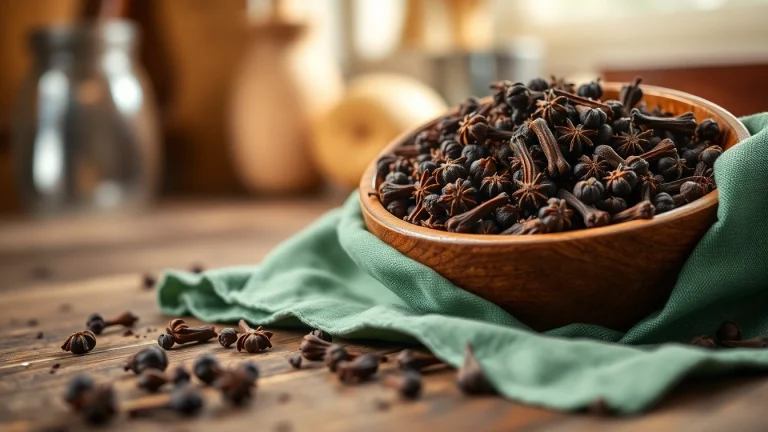
Unlocking the Benefits of Cloves: A Deep Dive into Their Uses and Health Advantages
Understanding Cloves: An Overview
Cloves are one of the most aromatic and flavorful spices known, often recognized for their unique taste and numerous health benefits. Derived from the flower buds of the clove tree (Syzygium aromaticum), these dried buds add depth and warmth to both culinary dishes and traditional medicine. With a rich history that dates back thousands of years, cloves have been used not just as a flavoring agent but also for their medicinal properties. This article explores the origin, benefits, uses, and storage of cloves, providing comprehensive insights for anyone looking to enhance their knowledge about this remarkable spice.
What Are Cloves and Their Botanical Background?
Cloves are the aromatic, dried flower buds derived from the clove tree, which belongs to the Myrtaceae family. The scientific name for the clove tree is Syzygium aromaticum. Native to the Maluku Islands of Indonesia, cloves grow on evergreen trees that can reach up to 20 meters in height. The buds are harvested when they are still immature, and before they have fully bloomed into flowers, which gives them their characteristic shape and flavor.
The flower buds develop from tiny green shoots and are often picked while they are still pink, which then dry to a reddish-brown color. In addition to their culinary uses, cloves are known for their high eugenol content, an essential oil that imparts their strong aroma and flavor, as well as many health benefits.
Where Do Cloves Come From?
Cloves originally hail from Indonesia, where they thrive in the humid tropical climate. The clove tree is now cultivated in several countries, including Madagascar, Sri Lanka, and India. These regions benefit from the warm temperatures and rich soils that are conducive to the growth of the spice. The majority of the world’s cloves come from these countries, with Indonesia and Madagascar being the largest suppliers.
The spice has been a significant part of the local economy, and clove cultivation remains a tradition that involves meticulous care, particularly during the harvesting period. From the time of their discovery, cloves have been traded extensively along ancient spice routes, increasing their value and popularity worldwide.
How Are Cloves Harvested and Processed?
The harvesting of cloves is a labor-intensive process. Buds are typically picked by hand, with harvest occurring once or twice a year. This process involves breaking off the immature flower buds just before they open, allowing for the preservation of their essential oils. The harvested cloves are then dried in the sun, which helps enhance their flavor and aroma while also preventing spoilage.
Once dried, cloves are sorted based on size and quality. They are then packaged for distribution. High-quality cloves are characterized by their strong aroma, uniform shape, and vibrant color. The processing methods play a significant role in maintaining the essential oils, which are responsible for cloves’ unique scent and health benefits.
Health Benefits of Cloves
Nutritional Profile of Cloves
Cloves pack a significant nutritional punch relative to their size. A teaspoon of ground cloves (about 2 grams) provides a modest amount of calories but is rich in essential nutrients. Key components found in cloves include manganese, vitamin K, and various antioxidants. Below is a brief overview of their nutritional components:
- Manganese: Vital for bone formation and metabolism, a single serving of cloves contains more than 30% of the daily recommended value (DRV) of manganese.
- Vitamin K: Important for blood clotting and bone health.
- Antioxidants: Cloves contain compounds that combat oxidative stress, including eugenol, which is known for its anti-inflammatory properties.
In addition, cloves have been shown to possess antibacterial and antifungal properties, making them a valuable addition to both the kitchen and the medicine cabinet.
Potential Medicinal Uses of Cloves
The medicinal applications of cloves are vast and varied. Traditions across the globe have embraced cloves not just for their flavor but also for their potential health benefits. Here are some noteworthy medicinal uses:
- Antimicrobial Properties: Cloves may help combat bacterial infections and reduce the risk of foodborne illnesses.
- Oral Health: Clove oil is frequently used as a natural remedy for toothaches and gum disease due to its analgesic and antiseptic properties.
- Digestive Health: Cloves might aid in reducing bloating, gas, and digestive discomfort.
- Anti-inflammatory Effects: The eugenol in cloves can reduce inflammation and pain, providing relief for conditions like osteoarthritis.
How Cloves Can Aid in Digestion and More
In terms of digestion, cloves have been used for centuries as a natural remedy. They stimulate digestive enzymes and promote better nutrient absorption. Drinking clove tea or incorporating cloves into meals may help alleviate digestive issues like gas, indigestion, or upset stomach.
More recently, research has also indicated that cloves could play a role in supporting liver health. The antioxidants in cloves might offer protection against liver damage induced by free radicals, bolstering the liver’s ability to process toxins.
Culinary Uses of Cloves
Popular Dishes Featuring Cloves
Cloves are celebrated in cuisines worldwide for their distinct flavor. They’re commonly found in both savory and sweet dishes, including:
- Spices Mixes: Cloves are often included in garam masala, a key spice blend used in Indian cuisine.
- Bakery: Cloves add a warm spice flavor to gingerbread, pumpkin pie, and holiday cookies.
- Meats: They can be used to enhance the flavor of hams and stews, particularly in dish preparations requiring slow-cooking.
Cloves’ unique flavor profile makes them versatile, finding their way into marinades, pickles, and beverages such as chai tea and mulled wine.
How to Properly Incorporate Cloves in Cooking?
When incorporating cloves into your cooking, there are a few tips to keep in mind to maximize their flavor:
- Whole vs. Ground: Whole cloves provide a slow-release flavor, while ground cloves release their flavor quickly. Depending on the recipe, choose appropriately.
- Moderation is Key: Due to their potent flavor, a little goes a long way. Start with a small amount and adjust according to preference.
- Soaking Before Use: For stronger recipes, soaking whole cloves in warm water or liquid before use can help amplify their flavor.
These guidelines can help to ensure that cloves enhance rather than overpower your dishes.
Unique Recipes to Try with Cloves
Here are a few unique recipes that showcase cloves:
Clove-Infused Rice
Ingredients:
- 1 cup long grain rice
- 2 cups water
- 2 whole cloves
- 1 bay leaf
- Salt to taste
Instructions: Combine water, cloves, bay leaf, and salt in a saucepan and bring to a boil. Add rice, reduce to a simmer, cover, and cook until done. Remove cloves before serving.
Pumpkin Pie Spice Blend
Ingredients:
- 1 tsp ground cloves
- 2 tsp ground cinnamon
- 1 tsp ground nutmeg
- 1 tsp ground ginger
Mix and store in an airtight container for use in pumpkin pie or spiced beverages.
Cloves in Traditional Medicine
Historical Uses of Cloves Across Cultures
Cloves have been utilized in traditional medicine systems for ages. Ancient Chinese and Indian medicine often used them to treat digestive ailments and infections. Historical texts suggest that cloves were used in Ayurvedic medicine for their warming properties, while in traditional Chinese medicine, they were used to treat a myriad of conditions, from indigestion to coughs.
The incorporation of cloves into natural remedies continues in various cultures today, with many people turning to them for support in overall wellness.
How Cloves Are Used in Herbal Remedies?
Modern herbalists recommend cloves as an ingredient in various remedies, often utilizing clove oil for topical applications. For instance:
- Topical Applications: Clove oil is commonly used for toothache relief when applied directly to the gums.
- Detox Drinks: Clove tea is a popular detox drink, believed to support liver function and digestion.
Before using any herbal remedy, consulting with a healthcare professional is advised.
Safety and Precautions When Using Cloves
While cloves are generally safe for consumption, some precautions should be considered:
- Avoid excessive use: Overconsumption may lead to adverse effects, including nausea or other digestive discomfort.
- Consult with a professional: Individuals with bleeding disorders or those taking blood-thinning medications should consult a healthcare provider prior to using clove supplements or oils.
- Pregnancy and breastfeeding: Limited safe use during these periods is advised due to the lack of definitive research.
Being aware of potential interactions and contraindications will help ensure the safe use of cloves in dietary and medicinal contexts.
Buying and Storing Cloves
How to Choose Quality Cloves?
When purchasing cloves, consider the following tips for selecting high-quality products:
- Whole vs. Ground: Whenever possible, purchase whole cloves. They retain flavor longer than ground and are less likely to be adulterated.
- Aroma Test: Fresh cloves should have a strong, pleasant aroma. A weak scent may indicate staleness.
- Color and Size: Look for uniform-sized, deep brown to reddish-brown cloves without dark spots or discoloration.
Best Storage Practices for Cloves
To maintain their potency, follow these optimal storage practices for cloves:
- Keep in a cool, dark place: Store cloves in an airtight container away from light and moisture.
- Refrigeration isn’t necessary: While cloves can be stored in the refrigerator, a pantry shelf is preferable for maintaining aroma.
- Check regularly: Periodically inspect your spice container for freshness, and replace as needed.
Proper storage greatly extends the shelf life of cloves, allowing them to maintain their rich flavor and properties.
Where to Buy Cloves Online and Offline?
Cloves are readily available at grocery stores and specialty spice shops. For online purchases, consider reputable retailers like:
- Amazon: A wide variety of organic options.
- Health food stores: These often have high-quality spices and organic choices.
- Local markets: Ethnic and local markets commonly stock fresh cloves.
When shopping, be sure to assess the quality and sourcing to ensure you’re getting the best product available.


